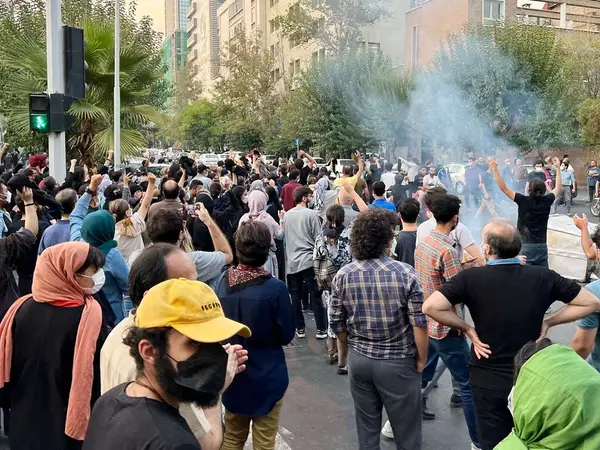An underground Tehran youth group has warned that the expatriate opposition’s delay in forming a coalition may provide the regime a chance to suppress the protest movement.
In a statement released on their Twitter account Saturday, Neighborhood Youth of Tehran has urged the opposition abroad to form a coalition to represent Iranian protesters among “other nations of the free world”.
The anonymous underground group was the first of youth groups to emerge in various Iranian cities that have taken a leading role in organizing protests since October when they announced their existence on social media. These groups use Twitter and Telegram as their main platforms. Several of the groups recently announced they had formed a larger group calling itself Neighborhood Youth of Iran (Javanan-e Mahallat-e Iran).
These groups which have gained considerable influence in a short time are united in their goal of toppling the regime through organizing protests and strikes. Their only platform is social media despite heavy internet restrictions and blocking all major platforms.
The Tehran group’s new statement has stressed that a revolution can only happen through protests and strikes, while indirectly criticizing various political figures and groups abroad for having failed to reach an agreement among themselves to form a coalition that can help the revolution and be its international voice.
“One day we decided to organize together, despite some ideological differences, and to focus on one goal, the toppling of this child-killing regime, in solidarity and unity,” the statement said. “Revolutionaries inside the country have long been waiting for news [of such a coalition] any delay of which could cause loss of hope to combatants,” they said.
“Who will be our representative in talks with other nations of the free world if patriotic and freedom-seeking political groups abroad cannot form a coalition in tandem with heroic movement of the people across this land?”, the statement said, adding that any delay in the formation of such a coalition would only give the regime a better chance of suppressing the movement and “bloodshed”.
“We urge you to agree on a mechanism and procedure to elucidate the perspectives on the day after the victory [of the revolution] and unite under one flag, for the sake of the innocent bloods shed in this path, to introduce the path of solidarity so that others will join you along,” the statement said.
Revolutionaries of the “leaderless revolution of Iran” have invested their hopes in some political figures living abroad who have the means to relay their message to the world to unite and take the role of leaders of the movement for the time-being and through the period of transition from the Islamic Republic to a new government.
Among these, several appear to have high popularity, at least according to some social media polls, including the former Crown Prince of Iran, Reza Pahlavi, activists Hamed Esmaeilion, Nazanin Bonyadi, Masih Alinejad, environmentalist Kaveh Madani, and very popular soccer player Ali Karimi.
Several dissident figures still living in Iran also appeared to be popular in a Twitter poll two weeks ago which offered a long list of possible candidates.
Two political prisoners, Hossein Ronaghi and Fatemeh Sepehri, were among the most popular as well as and two popular soccer players, the legendary player Ali Daei and Vorya Ghafouri, who have openly supported the protest movement despite pressures, constant intimidation. The regime shut down Daei’s businesses last week and Ghafouri was arrested in November and later released on bail.
The regime has almost effectively wiped out or neutralized independent political parties and groups, non-governmental organizations, dissident figures and even moderate critics through prosecution and censorship.
The few extant reformist parties have lost their influence among the populace in the past few years. “People have been through periods of reformism and have not achieved any results. They have now put reformists behind,” Ali Shakourirad, a veteran reformist and spokesman of the once very influential Reformist Front said at a political gathering on November 29 while Mohsen Mirdamadi, another prominent reformist figure, said last week that disillusioned Iranians have put behind them “not only reformists, but also everything [within the Iranian polity]” including any hopes of change through elections or reforms.
